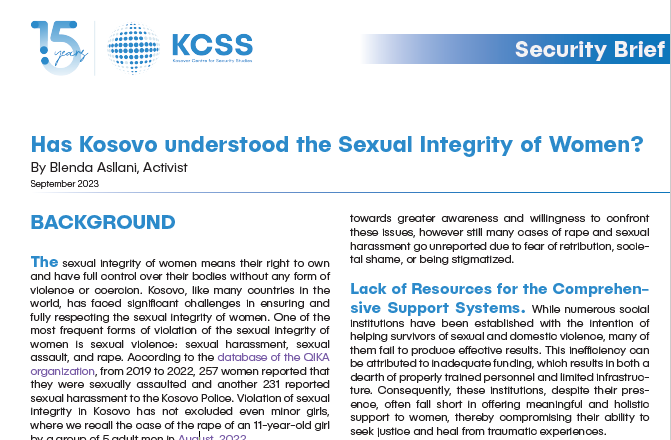26/09/2023

Vërejtje: Ky shkrim momentalisht është vetëm në versionin Anglisht.
Autore: Blenda Asllani
Background
The sexual integrity of women means their right to own and have full control over their bodies without any form of violence or coercion. Kosovo, like many countries in the world, has faced significant challenges in ensuring and fully respecting the sexual integrity of women. One of the most frequent forms of violation of the sexual integrity of women is sexual violence: sexual harassment, sexual assault, and rape. According to the database of the QIKA organization, from 2019 to 2022, 257 women reported that they were sexually assaulted and another 231 reported sexual harassment to the Kosovo Police. Violation of sexual integrity in Kosovo has not excluded even minor girls, where we recall the case of the rape of an 11-year-old girl by a group of 5 adult men in August, 2022.
The recent data from the Information System of the Kosovo Police is a sobering reminder of the gravity of this situation: from January to May 2023, there have been 42 committed and 4 attempted rape cases. As Kosovo progresses towards enhanced national development and global integration, addressing sexual violence becomes crucial not just for individual well-being, but also as a fundamental matter of human rights, gender equality, public safety, and social cohesion.
Challenges
• Inefficiency of the Judicial System
Inefficient and delayed treatments of reported cases of sexual harassment, sexual assault, and rape create gaps in the advancement of justice for women affected by these phenomena. The inefficiency is seen in the discrepancy between the reported cases and the sentences, or the low and late sentence. According to the 2022 report "Evaluation of the handling of cases of rape by the justice system in Kosovo", of the EULEX Mission in Kosovo, the increase in cases of rape and the low level of punishments imposed on the perpetrators of this crime are worrying. "The mission has analyzed 36 cases, 16 were with acquittals and among the 20 cases of convictions, more than half were under the minimum duration of the sentence according to the law," official Chiara Tagliani told OraNews.
• Underreporting
It is worth noting that the number of reported cases of sexual and domestic violence has increased in recent years, reflecting a positive trend towards greater awareness and willingness to confront these issues, however still many cases of rape and sexual harassment go unreported due to fear of retribution, societal shame, or being stigmatized.
• Lack of Resources for the Comprehensive Support Systems
While numerous social institutions have been established with the intention of helping survivors of sexual and domestic violence, many of them fail to produce effective results. This inefficiency can be attributed to inadequate funding, which results in both a dearth of properly trained personnel and limited infrastructure. Consequently, these institutions, despite their presence, often fall short in offering meaningful and holistic support to women, thereby compromising their ability to seek justice and heal from traumatic experiences.
Way forward
• Relevant institutions must provide the full implementation of the Istanbul Convention, which aims to prevent violence, protect its victims and prosecute perpetrators.
• The Government should start a nationwide campaign focusing on the importance of sexual integrity, significance of reporting, the mechanisms available, and the protections ensured for survivors, all aimed at reducing the stigma associated with reporting sexual offenses.
• The establishment of a special division in each Basic Court, dedicated exclusively to sexual offenses. This division should be staffed with judges, prosecutors and other staff exclusively trained to handle sexual offense cases sensitively and in a timely manner.
• The Government should adopt a policy that mandates the publication of the identities of individuals convicted of rape, while ensuring that the privacy rights of survivors are preserved. This serves as an important deterrent to potential, and recidivist rapists and can work to inform and protect the community.